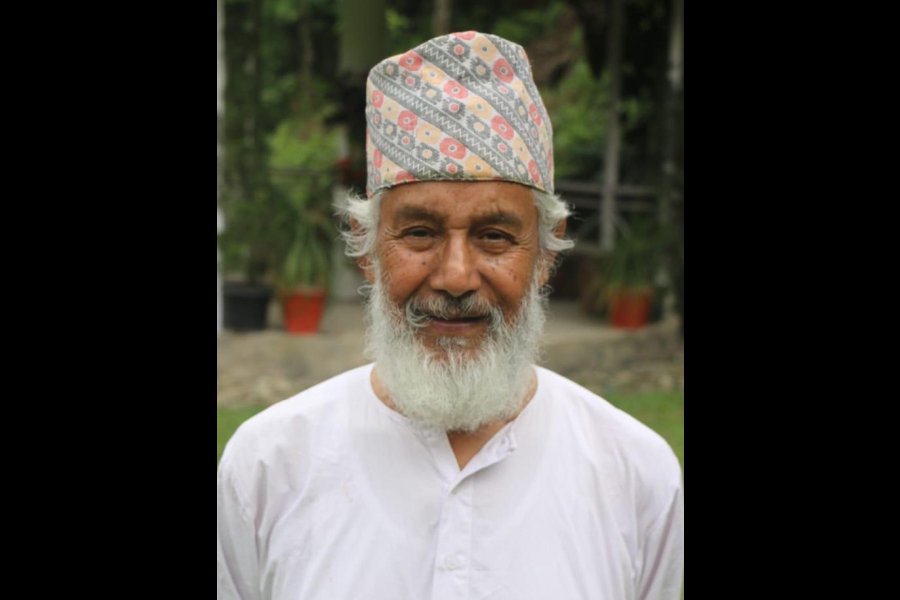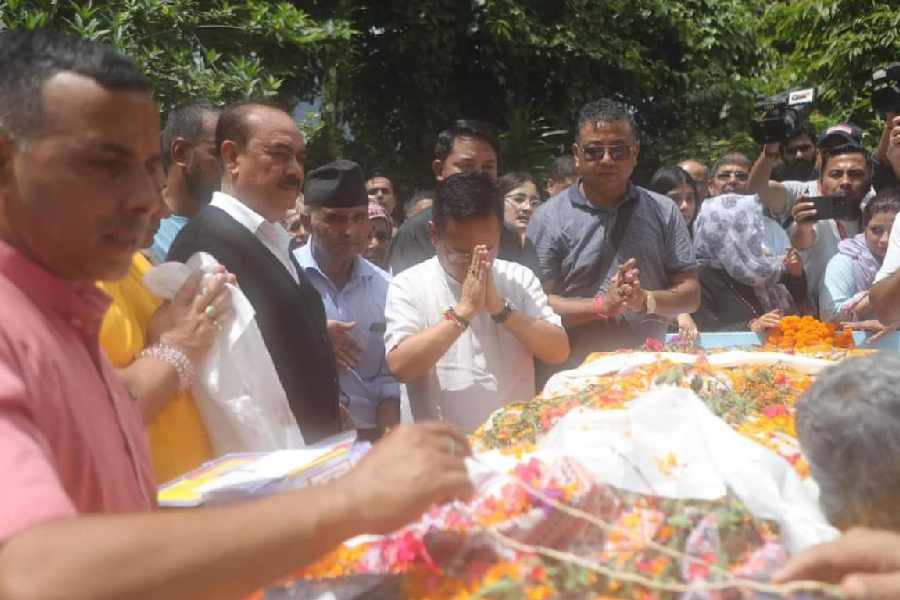A Tissot watch that Ram Chandra Poudyal, 80, a prominent pro-democracy leader and former minister of Sikkim, was wearing helped police identify his body that has been found 8km inside the Bangladesh territory.
Poudyal, who was also a former deputy Speaker of the Sikkim Assembly, had gone missing on July 7. His mobile phone was last tracked down to Rangpo, a town along the Bengal-Sikkim border the same day.
Sources said the Bangladesh authorities had found a body that had been swept ashore by the Teesta in Lalmonirhat district on Monday. The spot is about 8km from the international border.
“The person could not be identified from his face or the clothes that he was wearing. The clothes were on the body but the colour had been washed off and had become extremely thin,” said a source.
R.C. Poudyal, as he was popularly called, was wearing a light blue kurta with a white pyjama and a Nepali topi and was carrying a red umbrella and a black walking stick when he left his Chota Singtam residence in Pakyong district around 9am on July 7.

RC Poudyal
He had told his family members that he would return by afternoon after visiting his relatives nearby.
Sikkim police had constituted a special investigation team (SIT) to trace the missing person and announced a cash reward for any lead in the case.
After the body was found, messages were exchanged between the Lalmonirhat authorities and Cooch Behar police.
“The body was identified with the help of the Tissot watch he was wearing,” said Dyutiman Bhattacharya, superintendent of police, Cooch Behar.
Tissot traces its history to 1853 and is a classified luxury brand manufactured by the Swatch Group in Switzerland. Well-known celebrities who have been seen wearing Tissot watches include actor George Clooney and celebrity singer Justin Bieber.
Even though Poudyal was wearing a Tissot watch, he lived a simple life in his village spending most of his time reading religious books of all faiths.
After the identification of the body on Tuesday evening, the post-mortem was conducted at Lalmonirhat in Bangladesh and the mortal remains were handed over to Poudyal’s family members in the presence of the Border Guard Bangladesh (BGB), BSF and the Cooch Behar police at the border outpost of Changrabandha.
Sikkim chief minister Prem Singh Tamang (Golay) attended the funeral of Poudyal at Chota Singtam on Wednesday.
Former Sikkim chief minister Pawan Chamling and a host of other leaders sent condolence messages to the bereaved family.
Poudyal had actively participated in the 1973 “democracy movement” of Sikkim and gone on a seven-day fast in Gangtok.
“His fast helped mobilise people for the movement,” Somnath Poudyal, Poudyal’s brother and a former Sikkim minister, had told The Telegraph earlier.
The agitators were demanding a written constitution, fundamental rights, universal adult franchise and abolition of a reservation formula prevalent in Sikkim then. Sikkim was then under the rule of Chogyal Palden Thondup Namgyal, who had been crowned in 1965.
With Chogyal unwilling to succumb to the demands, thousands took to the streets for three days from April 3 to 5, 1973. Six people were killed and hundreds were injured in the three-day agitation.
Representatives of some political parties in Sikkim approached the then Indian Prime Minister, Indira Gandhi, for intervention to restore law and order in Sikkim which was officially a protectorate state of India.
Chogyal was also persuaded to appeal to India to take over the administration of Sikkim until a solution was worked out.
Subsequently, Sikkim political parties, Chogyal and the Indian government signed an agreement, which, many say, drastically reduced the king’s powers.
It was also agreed that the number of seats in the Sikkim Assembly would increase from 17 to 32. While the Bhutia/Lepcha and Nepali communities had 15 seats each reserved in the House, the Sangha and the Scheduled Castes were represented by one member each.
In the 1974 elections, the Sikkim Congress won 31 of the 32 seats with R.C. Poudyal winning from the Loosing-Pachekhani seat.
“He had been the deputy Speaker of the Assembly from 1975 to 1977 and later became a cabinet minister of forest and land and land reforms department,” said Somnath.
Following the 1974 elections, the Sikkim Assembly held a referendum, which resulted in New Delhi conferring the status of India’s full-fledged state on Sikkim. India’s Lok Sabha passed the 36th Amendment Bill, 1975, which the President signed into law on May 16, 1975.
“My elder brother fought for democracy despite being close to Chogyal, who even used to visit our house. However, when the seat reservation for the Nepali community was done away with, he stood up against the decision,” said Somnath.
R.C. Poudyal was also the founder of the Rising Sun party.
Poudyal is survived by his wife and three daughters.











